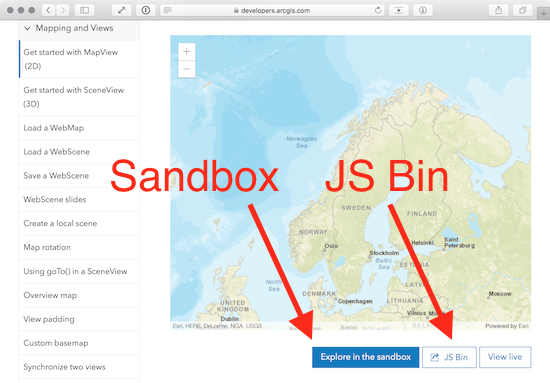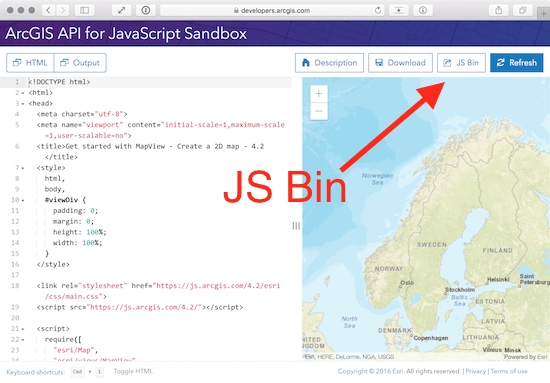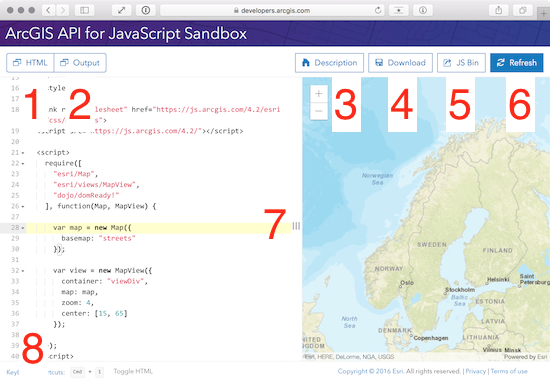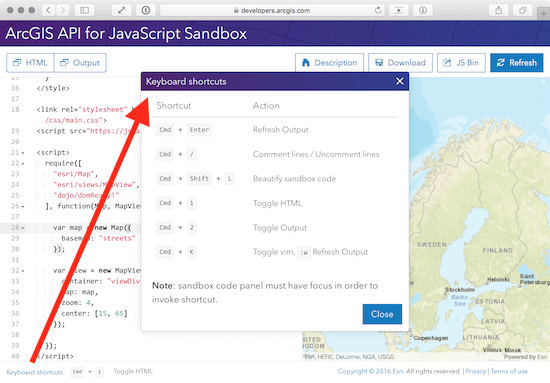We love getting direct feedback from our user community! The purpose of this blog post is to introduce users of the ArcGIS API for JavaScript to some new functionality in the Sample Code section of the website and to foster communication between our user base and team at Esri. Some content in this post may be a review for our long-time users but should reinforce ways to strengthen our user community’s communication and collaboration for all.
ArcGIS API for JavaScript website updates
We are pleased to introduce some new functionality in the Sample Code section of the ArcGIS API for JavaScript website that may have been overlooked in the 4.2 release back in December 2016. These features will foster productivity and collaboration throughout the user community.
JS Bin
The sample code description pages have always contained links to the ArcGIS API for JavaScript Sandbox but we have added another option for using JS Bin. Developers now have the option of exploring the content immediately in a new JS Bin bin (code sharing session) or opening the familiar and recently updated sandbox.

Note: the JS Bin option will be especially useful for sharing your code on the GeoNet forums or with Esri Technical support.
Remember part of submitting a great request for feedback starts with focused sample code that demonstrates the issue or problem as well as a detailed description of the steps to reproduce the issue with the browser version and operating system.
For more information on JS Bin please read the Getting started with JS Bin. While it is strictly optional, registering with JS Bin allows additional features such as bin history and shortcut urls.
JS Bin in the Sandbox
The sandbox is a great way to quickly view the code and output without leaving the ArcGIS API for JavaScript website and will serve most users needs. The sandbox also contains a link to open your latest sandbox edits in JS Bin to share.

When it comes time that you need to share your code with a colleague or need help on the forums, just click the JS Bin button to open the current sandbox code in JS Bin, save a snapshot of the bin, and share the JS Bin link e.g., (https://jsbin.com/mokezem/edit?html,output) with the user community.

Sandbox updates
The sandbox recently received a much-needed facelift and we are excited to share some of the updated functionality contained in the sandbox update. The sandbox continues to provide the same functionality that it has since first introduced in the 3.x version.

- Toggle the visibility of the sandbox HTML code editor panel.
- Toggle the visibility of the sandbox output panel.
- Navigate back to the sample overview description page.
- Download the sample code currently in the sandbox code editor panel.
- Open the sample code currently in the sandbox code editor panel in a new JS Bin session.
- Refresh the sandbox output panel with the current updates contained in the code editor panel.
- Increase or decrease the viewport width of the sandbox HTML / Output panels using the vertical slider.
- Open the keyboard shortcuts window to reveal the help.
Many of the updates are visual changes but there are some new features such as keyboard shortcuts and the ability to open the current code changes in a JS Bin code sharing session. For more information on the keyboard shortcuts view the Keyboard shortcuts screenshot or try them out for yourself.

Once you start using the keyboard shortcuts, you will wonder how you ever did without them. Refreshing the output window (Ctrl/Command + Enter), Comment / Uncomment line (Ctrl/Command + /), and Beautfying (formatting) the sandbox code (Ctrl/Command + Shift + L) are the immediate time savers. However, long time vi users will love (Ctrl/Command + K) to toggle the keyboard mode of the sandbox code editor into vim mode. The keyboard shortcuts commands display properly for Windows and Macintosh operating systems. Note: the sandbox code editor panel must have focus in order to invoke the keyboard shortcuts.
We hope you enjoy the updates to the sandbox and JS Bin integration. Note: these updates will be coming to the 3.x sandbox in the coming weeks.
Forums – GeoNet
One of the easiest ways to give and receive feedback from the user community and individuals on the JavaScript team at Esri is through the GeoNet forums. Many individuals on the JavaScript team at Esri check the ArcGIS API for JavaScript Web Developers channel in the GeoNet forums on a regular basis. We also have an internal communication channel where we can solicit feedback for user questions to team members to better serve the user community when answering questions on the forum. The two of these together provide a great mechanism to help our community be more productive.
ArcGIS API for JavaScript website feedback
Another collaborative feature of the 3.x and 4.x ArcGIS API for JavaScript website are the Feedback on this topic? links at the bottom of every page within the website. The JavaScript Product Engineering team review and respond to your feedback through this channel fostering the website content to continually improve in all your invaluable feedback. We receive a lot of feedback through this mechanism and we thank you.
The type of feedback that is the most helpful for the team through this mechanism consists of errors related to the website itself, such as broken links or samples, errors in the API Reference, etc. Questions about how to write code or solve a particular workflow should be addressed in the GeoNet forums.
Esri support
Also, don’t forget you can always submit support incidents through support.esri.com. Developers and organizations that are currently on maintenance or paid support subscriptions have access to Esri Technical Support through email, Phone, or chat. If you think you may have found a bug in the software, please submit an Esri support incident. These issues will be tracked through the Esri support system and helps everyone in the community. For a list of issues fixed in each release be sure to read through the What’s New in 3.x and the Releases notes in 4.x.
We hope this article helps to improve the lines of communication between our strong user community and the JavaScript team at Esri.

Commenting is not enabled for this article.